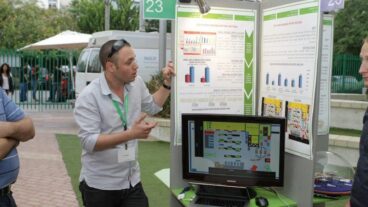“We’re trying to identify genes associated with hearing loss with the hopes of improving the quality of life for people with this disorder, and to understand the function of the inner ear that allows us to hear properly.” – Professor Karen Avraham.In an area of the world where people do not always seem to listen to one another, a research project probing the genetic basis of deafness is a living metaphor for how people can listen and learn from each other across the Israeli-Palestinian divide.
Teams at Tel Aviv University and Bethlehem University are working together to find the genetic basis of deafness. The leaders of this research, Professor Karen Avraham from Tel Aviv University and Professor Moien Kanaan from Bethlehem University, have begun a joint graduate program designed for Palestinian students who have completed an undergraduate degree in science at Bethlehem University to pursue a post graduate degree at Tel Aviv University.
Hashem Shahin, the first student of the joint graduate program, is a resident of Bethlehem doing his post graduate degree at TAU on the genetic basis of deafness. He obtained his Bachelor of Science’s degree from Bethlehem University and his Master of Science’ s degree with Distinction at Tel Aviv University in September 2002.
One of the main reasons Avraham and. Kanaan developed the joint graduate program was to provide a way to train Palestinian students in genetics and allow them to access to a post graduate diploma, which does not exist at Bethlehem University.
“We’re trying to identify genes associated with hearing loss with the hopes of improving the quality of life for people with this disorder, and to understand the function of the inner ear that allows us to hear properly,” said Avraham.
“Hashem was willing to come to Tel Aviv to get a degree because they don’t have a graduate program at Bethlehem University and he wanted to be close to home. He has done incredibly well, graduating with honors,” said Avraham.
Through the initiative, the two professors also hope to increase the scientific cooperation between Israelis and Palestinians.
“Peace was the impetus, and the motivation was science,” said Avraham, who has been at Tel Aviv University for seven years. “Professor Kanaan and I started working together 6 years ago. I was working on the genetics of deafness and my PhD advisor connected us. Something ‘clicked’ with us, our common scientific interests, the fact that we both believe in peace and in building a future together.”
“As an Israeli, I feel that the more we can help build the Palestinian infrastructure and education system, and the stronger they become from an academic point of view, then the better we?ll be able to live side by side,” she added.
According to Avraham, Bethlehem University is now advertising for more participants in the program.
The joint program is funded with a boost of $100, 000 from Professor John Sulston, one of the first winners of the Dan David Prize. Every year, the Dan David Foundation awards three persons or organizations the sum of one million dollars each for exceptional work. Sulston was awarded the 2002 Dan David Prize for his outstanding contribution to research and biogenetics breakthroughs. A Dan David Prize rule stipulates that a tenth of the $1 million prize be given to help another individual excel in his field, such as doctoral students. This “mentoring process” is aimed at encouraging young researchers in their respective endeavors and innovation.
Funding from the Dan David Prize winnings provides tuition, stipends, and dorm expenses for Palestinian students at Tel Aviv University. Moreover, it allows both of the advisors, Kanaan and Avraham, as well as Shahin, to enhance the collaborative nature of the work, and to ensure that the three are able to meet to discuss and present the scientific work performed.
“Because of frequent difficulties in commuting between Bethlehem and Tel Aviv, Hashem was at the university without a break since October. He stays here and doesn’t commute – his mother won’t let him take busses. The irony is that he came here in the first place in order to be close to home. There’s also the concern that if things are rough, and the army changes the criteria, he won’t be able to come back if he goes home,” said Avraham.
Avraham, who immigrated to Israel from New Jersey in 1984 and received her PHD from the Weizmann Institute, said that working closely with two Palestinians has not resulted in too many areas of conflict regarding what’s happening on the ground.
“We come from similar ideas – in working together to promote peace. Moien has signed petitions against suicide bombings. If there’s a particular area we don’t agree on, then we don’t deal with that issue. The bottom line is that we’re scientists and science comes first.”












